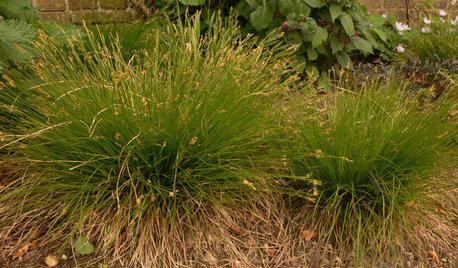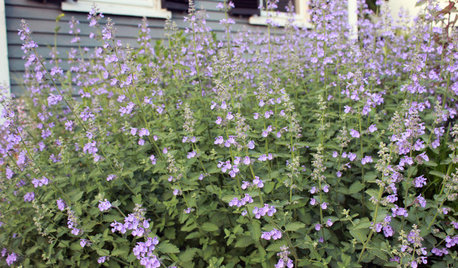why is miracle-gro bad
If my veggies are getting other nutrients from worm castings and fish emulsion, but still need more nitrogen, then can someone please explain why small quantities of miracle-gro is bad for them?
I am committed to organics, but am questioning some assumptions taken for granted.
Thanks,
deepti
Comments (103)
fruitgirl
16 years agolast modified: 9 years agoOK, I've kept out of this, but I do want to say this: I don't think organic production is always sustainable. For example, on large-scale fruit production farms, organic weed control isn't, IMO, sustainable. The repeated applications of vinegar, and even worse, propane flaming, that are necessary to control weeds has to use much more fossil fuels than conventional herbicides.
Given that a popluar definition of sustainable agriculture is "A method of agriculture that attempts to ensure the profitability of farms while preserving the environment," I'm not sure that propane flaming really fits in here, or hand weeding hundreds of acres because of profitability.
Is organic in home gardens sustainable? Most likely.
Is organic on large scale farms sustainable? Not always.
That's why I believe so firmly in sustainable ag. I think it combines the best of organic and the best of conventional production.
end3
16 years agolast modified: 9 years agoTry telling the guy with 30, 300, or 3000 acres that organic is always better...why is inorganic the predominant practice, because it works, not always friendly, but has evolved, so still, how is organic going to evolve to the predominant practice if you won't let the evil housewives and commercial farmers in. How about hydroponics, is that evil as well? Ya'll need a solution, think, think, think
Related Professionals
Norfolk Landscape Architects & Landscape Designers · Berwyn Landscape Contractors · Brownsville Landscape Contractors · Coram Landscape Contractors · Longmont Landscape Contractors · Oklahoma City Landscape Contractors · Paramount Landscape Contractors · Point Pleasant Landscape Contractors · Palos Heights Landscape Contractors · Fort Collins Decks, Patios & Outdoor Enclosures · Kernersville Decks, Patios & Outdoor Enclosures · Layton Decks, Patios & Outdoor Enclosures · Rosemont Decks, Patios & Outdoor Enclosures · Wheaton Decks, Patios & Outdoor Enclosures · Canyon Lake Stone, Pavers & Concretegemini_jim
16 years agolast modified: 9 years agoIt's true. Organic isn't necessarily sustainable and sustainable isn't necesarily organic. Sometimes you can get both, even commercially, but not usually on a large scale.
Along these lines, I'd recommend the book Omnivore's_Dilemna by Michael Pollin. He traces 4 different meals back to their origins: conventional, large-scale organic, local/sustainable, and hunted/gathered/homegrown. Eye-opening and entertaining!
paulns
16 years agolast modified: 9 years agoIs organic in home gardens sustainable? Most likely.
Is organic on large scale farms sustainable? Not always.
That's why urban farming is at the cutting edge of organic growing.
"Havana, home to nearly 20 percent of Cuba's population, is now also home to more than 8,000 officially recognized gardens, which are in turn cultivated by more than 30,000 people and cover nearly 30 percent of the available land."
Organic gardens, that is.
A chef who comes each summer from the city of Toronto (pop. ~2 million) to work at a resort near us tells me he sees vegetables growing on trellises on the balconies of high-rise buildings downtown, more and more. From what I've read these are mostly immigrants, growing their own food.
About Miracle gro, one point I'd like to make is that you're not just using it, you're supporting the synthetic fertilizer industry, while by buying fish emulsion or raingrow, say, you're generating more demand for something organic that would normally be a waste product. (which leads me to wonder if anybody's ever tried to market a fert. derived from pig manure, which is such a waste problem, or is that smell impossible to sanitize?)
Another thing is that I think this is all about faith, or the lack thereof. Why do I not have faith that compost tea will give my plants that quick boost Raingrow gives them, and why do miracle gro users not have faith that something like Raingrow or fish emulsion will do the trick?
justaguy2
16 years agolast modified: 9 years agoand why do miracle gro users not have faith that something like Raingrow or fish emulsion will do the trick?
Experience.
Fish emulsion is great and it is my primary fertilizer, but it requires a small amount of bacterial processing to become available to plants. Miracle grow requires no bacterial processing.
In Wisconsin where I live I start gardening as soon as the soil unfreezes and well before the bacteria wake up (around 46F soil temp). Only water soluble synthetics are effective at this time and even in mid summer in super hot containers there is nothing faster acting than a water soluble (plant ready) synthetic fert.
It really is that simple.
I will say though that blood meal and fish emulsion are very fast acting for organics.
patty4150
16 years agolast modified: 9 years agoResources in southern california:
My city in Ventura county has city mulch available for free. Often times the mulch is fine enough to go in the compost or in a lasagna bed. Otherwise, it can serve as a more traditional shredded wood mulch. Starbuck's, similar resource for free orqanics. The used coffee grounds analysis by Sunset magazine is here: http://www.sunset.com/sunset/garden/edible/article/0,20633,1208232,00.html
LA county might have lots of free organic resources - though I am not familiar with the various cities' practices. I was thinking on another thread that I should find a "fish plant" to get free fish waste for my compost and lasagna beds. I would bet that LA has a ton more fish plants than Ventura county. Some grocery stores give their used produce. Jamba juice will give boxes of citrus peels. Noah's Bagels gives away day-old bagels by the garbage bag full.
On freecycle you can find bunny poo and more.
In other words, I think by virtue of the "california" thing we have going on here (a little hippy, a little progressive) there are good free resources of organic matter that can build soil for free and reduce use of fertilizers (organic or chemical). I'm sold on lasagna gardening, and it is easy, and I don't need much by way of fertiliser (a shot of fish emulsion now and then, maybe twice a year.). True, we don't have much by way of leaves or grass clippings, but we have lots of other organic stuff.
Peach Tree farms, in Ventrua County, gives away mushroom compost for free to various groups - like to community gardens. They are progressively-minded. Maybe other compost suppliers have similar programs to boost awareness.
Many churches will give away free straw bales after their annual pumpkin patches.
All that said. I have to confess I use non-organic practices on our blueberry area. (Darn pH is way too high and I am determined to get these bushes growing.) I also have some Miracle Gro under the sink - although it is about ten years old because I stopped using it about eight years ago.
Here is a link that might be useful: Coffee grounds analysis (slow release nitrogen fertiliser, and free)
decklap
16 years agolast modified: 9 years agoPaulns makes a great point in this discussion.
People tend to think of *their* use of MG or
Scotts W/Weedblock or whatever as if it existed
in a vacumn. Of course it doesn't even if a
given user is only using " a little ".End3. When asking why inorganic is the dominant
practice you have to take into the number of
salespeople in the employ of chemical companies
over the last 60 years or so as to
compared to the number of organic salespeople
roaming the countryside in that same time.Justaguy. Have you tried organic foliar sprays
for quick uptake?? I can't imagine that you're
growing anything in sub 50 soil that actually
needs more N than you're going to be able to
sray on the leaves.justaguy2
16 years agolast modified: 9 years agoJustaguy. Have you tried organic foliar sprays
for quick uptake??I have not. I should give that a try. Is there anything in particular you recomend?
pablo_nh
16 years agolast modified: 9 years ago"even the proliferation of improvised bombs in the Middle East! "
Ummm- they don't bother with ANFO in the Middle East. They use unexploded ordinance (UXO), and formerly took apart land mines. Those are RDX or TNT (old) based explosives. In areas not at war, a terrorist might also use ANFO, or urea nitrate, or they might make TATP or something in a kitchen. If you took away ANFO, it would not slow down IED production at all.
Saying that production of ammonium nitrate boosts the production of bombs is much like blaming obesity on proliferation of spoons.
gemini_jim
16 years agolast modified: 9 years agopablo_nh, thanks for the info re IED's. I didn't know that.
lilacs_of_may
16 years agolast modified: 9 years agoWe're all works in progress. So are our gardens. I hate to see an "all-or-nothing" attitude prevail. If 20 people go 5% organic, that's the equivalent of 1 person being 100% organic, which is better than if those 20 people just shrugged and figured they couldn't do enough to make a difference, so why try?
The best way to fight disease and stay healthy is to follow good health and nutrition practices. Equivalent to building up the soil. But whether we eat junk food or organic carrots, sometimes supplements are still a good idea. Miracle-Gro is kind of like Vitamin C. Vitamin C is only one vitamin. It's one we need, but if we got our Vitamin C through fruits and vegetables, we'd also get other vitamins, fiber, lycopene, lutien, bioflavonoids and probably a lot of other things that we're not even aware of yet.
And sometimes, for whatever reason, we get ill and our immune system can't fight off the bug. That's when we take out the big guns and use antibiotics. If we take care of the "soil," so to speak, we might only rarely need antibiotics. I'm all for antibiotics. When you have COPD and contract pneumonia, they're called for. It's the indiscriminate use of needless antibiotics that are getting us into trouble with such things as XDR TB.
All this to say that there's a place for nonorganic practices, but my opinion is that that's not where we should turn first.
decklap
16 years agolast modified: 9 years agoJustaguy,
We're in the same zone so Im assuming we're
both putting roughly the same stuff out early?
Peas, greens, carrots...etc It sounds like
you're getting stuff in the ground sooner
than I do so it must work for you but I usually
wait awhile longer than I otherwise might to
warm the soil up with my coldframes.shazam_z3
16 years agolast modified: 9 years agoSo, um, what do people think of Plant-Prod products?
I mainly used a product called Wegener's (liquid) for the last couple of years. I've been getting spectacular results with it on, well, everything. I recently switched over to a locally made product called Wurzel Dip (liquid seaweed) that seems to be even better.
Both are organic products. I've also amended my very, very heavy clay soil with peat moss, compost, sand, bone meal, bark mulch, perlite, vermiculite, zeolite and leaves for the past five years. I've been able to make incredible inroads with the soil. I transplanted a small rose bush this week and I was astonished at the incredible transformation of the useless clay soil into wonderful, black soil.
But I find the fast-acting products very useful for providing nutrients quickly to growing and transplanted plants. I do not use these products regularly - two applications per growing season is all.
Is using Miracle-Gro bad? Nope. Is using Miracle-Gro by itself bad? Yup. You also need to improve the base product - your soil.
Also, for my annual pots and baskets, I regularly use liquid fertilizer (Plant-Prod) on them. My growing season is short, and if that's what it takes to make my petunias three feet high, so be it. I am however very careful not spill or overflow the fertilizer.
Of course, if you live in the desert that is southern California, well, good luck :)
ronalawn82
16 years agolast modified: 9 years agolilacs of may, likening 'Miracle-Gro' to vitamin C is not a wholly fair comparison. 'Miracle-Gro' provides the macro and some micro elements needed by plants, in a soluble and easily available form. A vitamin, as I understand it, is not a nutrient but it enables physiological processes which promote good health. Vitamin C has been used on plants in laboratory studies for specific purposes.
dchall_san_antonio
16 years agolast modified: 9 years agoHere's the answer I used to give to this question...
Here's a list of things an organic program can do that no chemical can do. The beneficial microbes in the soil do the following.
1. Decompose plant residues and manure to humus.
2. Retain nutrients in humus.
3. Combine nitrogen and carbon to prevent nutrient loss.
4. Suppress disease.
5. Produce plant growth regulators.
6. Develop soil structure, tilth, and water penetration/retention.
7. Clean up chemical residues.
8. Shift soil pH to neutral and keep it there.
9. Search out and retrieve nutrients in distant parts of the soil.
10. Decompose thatch and keep it from returning.
11. Control nitrogen supply to the plants according to need.
12. Pull minerals out of inorganic soil components for plants.
13. Provide the exact chemical nutrients to the plant that the plant has evolved with rather than man's cheapest chemical approximation.
14. Provide exactly the required quantity of nutrients that the plant needs.
15. Provide the nutrients at exactly the right time that the plant needs them.No chemical fertilizer can do any of that. To be fair, no single microbe can do all of that either. In fact, it could be that it takes 10 different species, one working right after the other, to do any one item in the above list - sort of like a microbiological assembly line. But at least it's real easy to get all the right microbes. The biology of the soil is very complicated.
At the same time, many chemicals inhibit the microbe's natural abilities to do these things. Herbicides, fungicides, and pesticides are all designed to kill various biological life. As a byproduct, they often kill off the beneficial microbes that are doing 1 through 15 above. Any break in the assembly line can interrupt the process, damage the mini ecosystem, and lessen the benefit of the organic methods.lorna-organic
16 years agolast modified: 9 years agoI am an organic gardener because I am chemically sensitive. My sensitivity often manifests as migratory arthritis (some doctors call it lupus). I find that I am generally pain-free and limber, when I do not eat fruits and vegetables which were grown with the use of chemical fertilizers and/or pesticides. Unfortunately, I do also have to avoid eating the deadly nightshade family of food plants (tomatoes, potatoes, eggplant, etc.).
To me, organic is about soil building. Soil should be a living ecosystem. Chemicals do not foster living soil. A rule of thumb in the organic world is that soil must be chemical free for ten years to qualify as "organic".
Organic is also about recycling; building new living soil from kitchen waste, as well as dead, and dying plants. It is rather like creating a bit of magic. How wonderful to be able to create life from "nothing"!
tclynx
16 years agolast modified: 9 years agoAbove somewhere someone stated that MG does not require soil bacteria or microbes to make the nutrients available to plants but that isn't really true. If it were true then MG would work just fine as a hydroponic nutrient. It does not as the nitrogen is primarily urea which requires soil microbes to change it to nitrate form for plant uptake.
Granted that is all beside the point of if MG is bad or how it affects organic gardening and all.
I've only just started learning about organic gardening though I've been into hydroponics for a while and know about that side of the MG issue. So far there is no true organic hydroponics but I'm keeping my eyes open. I have also been composting for a while and have a good hot bin going (above somewhere I think someone mentioned adding nitrogen to compost bins, easy free answer, have some one pee in it. Works like a charm to get a good hot compost going.) I'm newer to vermiculture and that seems to be going well too.
Anyway, I have some MG and have decided to run trials and test how certain garden beds do using different methods. Like some plants fed with MG, others are planted in compost, others are fed our own personal liquid gold, and the controls just planted and watered. This will give me experience with the different methods in my particular location (central FL.)
I suppose the most important thing for the environment (at least the run off side) is that any fertilizer be used carefully in moderation. Of course the more humus in the soil the better able the soil is to hang onto the moisture and nutrients but over irrigating will still leach nutrients.
I seem to be rambling so I should go now.
justaguy2
16 years agolast modified: 9 years agoDchall,
How does a completely organic soil, never had chemical ferts achieve 13-15?
It seems to me that the microbes and other organisms are going to do what they wish with the organic matter without respect to what a nearby plant needs.
One example would be soybean meal. It is very easy to deliver excessive nitrogen with it.
fertilizersalesman
16 years agolast modified: 9 years agoDchall, I am going to disagree with the following:
1. Decompose plant residues and manure to humus.
-Adding any source of nitrogen will help to break organic materials down, ultimately into humus2. Retain nutrients in humus.
-Humus has an anion and cation exchange capacity and will retain nutrients from any source3. Combine nitrogen and carbon to prevent nutrient loss.
-Nitrogen from any source will be fixed in a high carbon environment6. Develop soil structure, tilth, and water penetration/retention.
Gypsum, which is not an organic material, can have a strong effect on structure, tilth, and water penetration retention under certain conditions7. Clean up chemical residues.
Nitrogen from any source will help degrade carbon based chemicals like gasoline8. Shift soil pH to neutral and keep it there.
-organic materials will not do this10. Decompose thatch and keep it from returning.
-again, nitrogen from any source will increase the breakdown of organic materials11. Control nitrogen supply to the plants according to need.
-organic sources of nitrogen breakdown depending on temperature and moisture conditions which may or may not correlate with plant needs. Radishes and tomatoes for example need nitrogen in different parts of the season
.
13. Provide the exact chemical nutrients to the plant that the plant has evolved with rather than man's cheapest chemical approximation.
-there is nothing exact about decomposing organic materials in either time or content14. Provide exactly the required quantity of nutrients that the plant needs.
- see 13 above15. Provide the nutrients at exactly the right time that the plant needs them.
-see 11 aboveI am not disagreeing just be disagreeable or because I am opposed to organic growing, but you are pretty far off base on a lot of your statements. There are advantages and disadvantages to everything including organic growing. Many of what I consider disadvantages you listed as advantages.
lou_spicewood_tx
16 years agolast modified: 9 years agoFertilizersalesman-
Provide links to back up what you've said. Otherwise, I'm sticking to what DcHall says. You're really nitpicking some stuff. I'm sure Dchall could have explained things in MUCH MORE DETAILS but he generally keeps thing simple for majority of us so that we'd understand rather than get turned off by something we can't comprehend. Perhaps, you are really missing the whole picture in this....
justaguy2
16 years agolast modified: 9 years agoDo you really need a link to prove nitrogen from any source speeds the break down of organic matter?
Do you really need a link to prove organic matter breaks down and releases nutrients independent of plant needs?
Take a pile of organic matter and pee on it and watch it break down faster. Next take a comparable pile of organic matter and dump some high N Miracle grow on it and watch the same thing happen ;-)
If organic matter releases nutrients according to plant needs, then why does a compost pile in a plant free area still break down? ;-)
I have to agree with FSM on this one, there are a lot of statements being made in regard to organics that are simply not true. This isn't to say organics isn't a great approach, it is simply to separate fact from fiction.
patty4150
16 years agolast modified: 9 years agoI read Dchall's statements, especially the early ones, to be more closely in line with the idea that organic methods promote higher microbial diversity in soil.
Adding nitrogen will break down organic matter, but only if nitrogen is limiting in the first place, and only if microbes are present (they are the ones doing the breaking down of organic matter.) Greater microbial diversity generally equals greater metabolic potential, which means that generally speaking, a greater variety of organic substrates can be metabolized (broken down.)
I'll link to one article that discusses microbial diversity and soil function. It does not paint a black and white picture, but there are some indicators in the study that microbially diverse soil can handle stresses better than microbially depleted soils. there are plenty of articles to browse on this topic, in Google Scholar.
Here is a link that might be useful: Link
fertilizersalesman
16 years agolast modified: 9 years agoLou,
I presently do not have time to chase down sources. We were both speaking in general terms and if you have a specific question on anything I said I would be happy to address it. Again, I am all for organic methods, but at times I think people need a reality check. There are downsides to organic production.
Patty, there is never a shortage of microbes. They are everywhere and you can't get away from them. When the enviroment makes a favorable change for a given bug the population explodes. If the environment changes for the worse they will sit there ideling along waiting for conditions to improve. To break down carbon, nitrogen moisture and temperature have to be favorable. Generally speaking nitrogen is the limiting factor and the bugs do not care about the source. If you dump some nitrogen fertilizer on your leaf pile it will break down much much faster. Try it.
patty4150
16 years agolast modified: 9 years agoSalesman,
Microbial diversity estimates range from fewer than ten species per gram of soil in an extreme environment, such as acid mine drainage, to over 1 million species per gram in a pristine environment such as forest soils.
I'm a microbiologist, currently assaying diversity in oceanic methane seeps. I'm happy enough with my understanding of environmental microbial diversity and don't generally care for your tone, which is condescending. I said nothing against fertilisers, and you provided sweeping generalizations in response to my peer - reviewed science link.
patty4150
16 years agolast modified: 9 years agoI realize that you aren't meaning to sound condescending. I apologise for any offense my previous post may have caused.
fertilizersalesman
16 years agolast modified: 9 years agoPatty,
I promise I am not trying to sound like a snot face. When I am supposed to be working sometimes my posts are done in haste and may very well appear condescending. There seems to be a fad in organic circles about the need to manage the 'micro herd' in soils. The point I have tried to make to people is that microbes are not fragile, rare, or endangered. Provide a suitable environment and you really do not need to lose any sleep over the state of 'the herd.' I advise people who are concerned about such things to keep their pH in the proper range, add organic materials, and minimize tillage. Your thoughts?
patty4150
16 years agolast modified: 9 years agoI haven't noticed people trying to 'manage' their herds per se, so much as trying to understand at a microbiological level what is happening in soils. Some people are happy to pile up a compost bin and forget about it, other people are curious as to the mechanism of decomposition, which gets into chemistry and microbiology. Neither approach is right or wrong, and it all "works."
The question in this thread was "why is miracle gro bad." The answer is complex, because obviously there is an argument to be made that miracle gro is also "good." It simply depends on goals and practices, and generally speaking the more we understand the bigger picture of the effects of our actions, the better positioned we are to make responsible choices. Obviously, anything done to an extreme may have potentially negative consequences. Leach large quantities of chemical fertilisers into the ocean and you will have an algal bloom. Have a sewage spill ("organic") into the ocean and you will have an algal bloom.
For the purposes of the vast majority of gardening issues, guidelines such as you listed are definitely sound and sufficient. For those among us who are a little more nerdy, clips like this (from the link above) are fascinating, and also have their place on these forums: ~~~~~
Some broad-scale functional parameters increased as biodiversity decreased, e.g. thymidine incorporation, growth on added nutrients, and the decomposition rate of plant residues. Other more specific parameters decreased as biodiversity decreased, e.g. nitrification, denitrification and methane oxidation. Thus specific functional parameters may be a more sensitive indicator of environmental change than general parameters.-snip-
Resilience was reduced in the soils with decreasing biodiversity. Soils were not resilient to the persistent stress, there was no recovery in decomposition rate over time, but the soils with the highest biodiversity were more resistant to stress than soils with impaired biodiversity. The study of functional stability under applied perturbation is a powerful means of examining the effects of biodiversity.
fertilizersalesman
16 years agolast modified: 9 years agoPatty,
I wasn't really commenting on the original question, I was commenting on dchall's post. Regardless, it is all relative. Is increased decomposition of plant materials a good thing? It is if you need nutrients released durring mineralization. It isn't if you are trying to increase or maintain organic matter. As I said above there are advantages and disadvantages to everything. Keep in mind that the object of the exercise is to grow plants. It gets more complicated when one starts to worry about other factors such as the environment. Many people get so wrapped up in some small detail that they miss the big picture. In the grand scheme of things if conditions favorable to plant growth are maintained in an organic garden there is no need to worry about microbes because they too will be in a favorable environment.
ayceezone3
16 years agolast modified: 9 years agore shazam posting jul7,o7 about wurzel dip. where did you obtain it? i also live in Canada in zone 3
Kimmsr
16 years agolast modified: 9 years agoThe question is is organic gardening/farming sustainable? And the answer is yes, much more so than the current synthetic fertilizer system is. Far more energy is used to manufacture, and apply, the synthetic fertilizers than we get back from them while good organic practices use much less energy to produce the same amount of product. In the transition years that may be reversed, temporarily, but over time much less energy is required to garden, or farm, organically which means that organic farming is better for the 3rd world countries than the synthetic fertilizers, aside from the cost that few 3rd world farmers can afford.
There are those here arguing against what this forum is about because they have a vested interest in keeping synthetics on the market, so what they have to say must always be looked at with that in mind.byron
16 years agolast modified: 9 years agoH'm Ammonium Nitrate is from petrolium
Ferts like Mirical Gro do not provide tilth
I don't like high NPK, If I use a bottle/box/bagged fert, I would prefer some thing Like 3-2-2 or 6-6-6
tatiana131_hotmail_com
15 years agolast modified: 9 years ago@ayceezone3 - wurzel dip is sold at Professional Gardener in Calgary. Cheers.
novice_2009
15 years agolast modified: 9 years agowow,couldn't believe one question could get so many responses! I like kimmsers answer, don't want my plants on drugs! LOL. Not organic, synthetics. I understand the need to help out bad soil and failing plants, but take the time to build up the soil, try natural fertilizers. Miracle Grow is bad in organic gardening because it isn't organic! The more we support natural products, organic products, the more available they will be, maybe more people will go organic for the good of the earth and people. A quick fix isn't the answer, as I know the feeling of panic when things don't work out. However.....let's keep it green, not plants hopped up on drugs!
zardthegardener
14 years agolast modified: 9 years agoI started searching for an organic forum to ask this very question. paulns hit the nail on the head. It's much about faith. My wife and I have been using Miracle Grow and Vigoro for the past few years with very good success. We've never used synthetic pesticides, so we thought our methods were quite good.
After reading this forum for the past few months, we have decided to continue our journey towards an organic garden. This past weekend, we bought a bottle of fish emulsion. It's just sitting there, so it seems we haven't had enough faith to start using it yet. Do I stop using Miracle Grow and Vigoro cold turkey and start using the fish emulsion as directed on the bottle? Should I alternate between MG and the fish emulsion? We started harvesting two weeks ago, and we don't want this change to hurt the rest of this season.
Dan _Staley (5b Sunset 2B AHS 7)
14 years agolast modified: 9 years agoIf your purpose for organic is to stop using unsustainable petrochemical fert for ecological resilience, then you can start now on the fish emulsion for your leafy veggies. For the other veggies, your soil structure, composition and tilth likely should be sufficient if you have taken steps to make good soil.
If your purpose for organic is only personal health, MG is not poisonous and you can continue using, unless you build your soil structure to be dependent upon soil biota - MG in heavy doses can (can, not will) make them grumpy.
Dan
tiny1
14 years agolast modified: 9 years agoThis is my first year with a totally organic system. I had little time to prepare, but when I decided to try another garden, my wife and I decided that we would like it to be organic.
I had a garden a few years back, but was injured at work and needed to take a little sabatical. 3 years, my 20X25 space lay fallow. My garden had always been an Osmocote type of concern.
So, when my wife suggested that we grow organically, I agreed. I bought 4 yards of really good compost and had it delivered. I spread a 4-6 inch layer on my garden, which left me about enough to put in a couple of raised planters. I built 2; first one is 30 inches X 16 feet and the other is 4 feet X 8 feet. I tilled up the ground set the planter and filled it with a mixture of compost, soil, and peatmoss. I built these because I wasn't sure if my other space would be good, since I did not have time for a soil test. Turns out, all plants are doing well.
I make compost tea and use it once a month. I keep a bottle of liquid bone meal 0-12-0 and a bottle of natural nitrogen made from beet molasses 8-0-0. I use these only if I recognize a nutrient deficiency.
I compost about 2 yards/year,but I am in the process of expanding. I also receive about 4 pickup loads of leaves, which I use in the compost and use for leaf mold. I've built 2 more 4X8 beds, put in 9 fruit trees and 3 grape vines. I plan to do even more in the future, including an edible landscape thing in the front yard.
Am I solving pollution problems on a grand scale? Nope.
Am I developing a sustainable ecosystem that will feed millions? Nope. Do I sleep better at night knowing that I am helping the environment? Not really.
I do it so I know what is going into the bodies of my family and of course, myself.
I have noticed that I am having less problems with pests in this situation. The only problem I am having is flea beetles on my eggplant. I use Dr. Bronner's soap and a mix of soap, garlic and cayenne. My gardens border the woods, so there is planty of buglife. My soil must be pretty good.
IMO, there is not a half-step. You either grow organically, or you don't. The moment you resort to chemicals, you may as well continue on that path since so much depends on the organisms you will be killing.zardthegardener
14 years agolast modified: 9 years agoWe're not growing leafy vegetables and the soil probably isn't good enough this year to support our veggie plants without fertilizer. I guess converting to organic is not as easy as switching MG to fish emulsion. I'll save the fish emulsion for next year.
Our home garden consists of 3 beds totaling 140 sq ft. Next year, we plan on converting at least 1 bed to 100% organic. Not sure what we will do with the other two beds.
Dan _Staley (5b Sunset 2B AHS 7)
14 years agolast modified: 9 years agoIt's definitely more up-front work, but its a satisfying work. But - as a small example - the folk in the neighborhood who come look at the garden are amazed that I don't spray, water that much, etc. And they like the extra veggies too. Go get 'em.
Dan
sherryocala
14 years agolast modified: 9 years agoWhew! You folks have exhausted me. :)) Let me take a deep breath and collect my thoughts.
A few of the posters to this thread are in Florida and, hopefully, they and others can help me with my particular garden situation. I'm in my second summer of growing Old Garden Roses organically. The soil I started with is sandy marl with lots of limestone in it and a pH in the low 7s. All of my beds (most of my yard) were prepared by removing the top 8" of sand and replacing and mixing it with horse manure compost, pine fines, bagged topsoil and cow manure compost, and I mulch with oak leaves and pine straw. I amend with Milorganite, Rose-Tone/Holly-Tone, alfalfa, epsom salts mostly, occasionally soil sulfur. A few times a year I use alfalfa tea and fish emulsion. I do not use fungicides or pesticides. I believe the pH in my garden is in the high 6s, and the soil is beautiful and black but it's still sand. The first summer my roses were leafless from August through October and never really leafed out well until spring. Being a newbie, I was hoping this situation was due to their young age and insufficient mulch which contributed to heat stress. This summer the leaf loss started earlier even with more mature plants, thicker mulch and more rain (lots of rain). A rose friend suggested Miracle Gro after she followed Rose Society guidelines for granular and liquid ferts. (She also uses manure compost and organic feeds.) She found no help for her plants from the granular but did with the MG and remarked that someone on the Rose Forum had called MG "crack for roses in Florida", and she would be using it every 2 to 3 weeks.
I am not a microbiologist, but I use mycorrhizae every time I plant a rose and am intent on building my microbial population. Reading about nitrites and nitrates hurts my brain and evaporates instantly no matter how hard I try to retain the stuff. Apparently, Florida has a perfect storm of soil problems: sand, high heat (both air and soil) and lots of summer rain. Everything leaches fairly quickly through my soil, including, I suppose, the salts that are the bane of MG. I used the MG once three weekends ago with immediate results - larger new leaves, lots of new growth plus blooming. I repeated the application this past Sunday. My perspective is that healthy rose bushes must have leaves. My goal is to have leafy rose bushes (OGRs don't have the fungal problems of modern roses so that is not the problem), but my organically fed and composted garden is not accomplishing this in the summer. So my questions for this Organic Gardening Forum are these: will Miracle Gro damage my sandy soil structure, microbial activity, earthworms or anything else? Is my summer gardening situation the exception to the organic gardening rule? Will my sandy soil ever be organically sufficient? Here's a clue as to what I'm up against. I planted a rose this evening right at my property line in a bed that's more than three years old. Digging the hole revealed 3 to 4 inches of dark soil beneath which was yellow sand and cement-like gray sandy clay. So even in my well amended beds (not this edge part) my rose roots are growing down through at most 24" of amended garden soil into this sandy marl where I'm sure they get very little nutrition. So how far can an organic regimen be useful in my situation? My thinking is that Miracle Gro is a necessity at least in the summer if I want to continue growing my 94 rose bushes. I spend a fortune now on feeding and amending. Buying more fish emulsion can't be the answer considering the meager results.
Thanks in advance.
Sherry
david52 Zone 6
14 years agolast modified: 9 years agoEveryones situation is different, and I don't believe that there is any, hard fast rule that can't change over time and circumstance. I don't think an occasional spray with miracle grow is going to destroy your soil or your roses, roses are very heavy feeders anyway. But that shouldn't stop you from adding as much organic matter as you can get your hands on, and piling it up in the beds around the plants.
justaguy2
14 years agolast modified: 9 years agoSo my questions for this Organic Gardening Forum are these: will Miracle Gro damage my sandy soil structure, microbial activity, earthworms or anything else?
I am not sure it's possible to damage the soil structure of sand ;) No, MG isn't going to kill off your bacteria and fungi, but it also isn't going to do much to help them either. Will my sandy soil ever be organically sufficient?
Probably not, stuff just leeches waaaay too fast. I have read accounts from others who dug down a couple feet and then put a lot of leaves many inches thick and then covered it back with native soil. The idea is to provide a barrier, if you will, that slows the leeching of water and nutrients through the sand. Whether this works or is even practical in your situation I couldn't say. My thinking is that Miracle Gro is a necessity at least in the summer if I want to continue growing my 94 rose bushes.
Wow, you don't start off on a small scale do you?-)
It's a personal choice you have to make for yourself. Given the rapid leeching germane to your sandy soil and warm, humid climate organic matter simply isn't going to last all that long compared to other parts of the country.
I am not one to use MG in my ground gardens as I prefer a 'feed the soil' approach, but then again I deal with water/nutrient retentive clay soil, not sand a mile deep.
sherryocala
14 years agolast modified: 9 years agoThanks, David52 & justaguy2. I just left that Round Up thread and appreciated your reasoned and humorous posts. I've never read one that went to 150. So I'm glad you have replied to my questions. Rose addiction starts innocently from viewing the many gorgeous rose photos online. There is a rapid decline of common sense thereafter. Too bad my DH didn't catch the symptoms in time.
I do appreciate your confirmation of my thinking (not meant to be insulting.) I will use the MG perhaps in between fish emulsion applications in the summer. I have put several pick-up loads of horse manure compost on my garden this year and expect to next year along with lots of alfalfa. My error, I think, has been in underestimating the extent of their heavy feeding. The realization that I've been starving them is hard to take. My learning curve has been VERY steep. But reading of the efficacy of organic gardening convinced me that it should work. "Build the soil" and "healthy soil will cure everything" type of remarks might be true somewhere but not in my yard apparently. I stood back and watched thrips ruin my spring flush without spraying any chemicals so I'm drinking the Kool-Aid for the sake of the bees and the earthworms. I wish there were something besides MG. Would the Rose-Tone work here if it were applied diligently every month? But it won't change anything even if you say yes, since I can't make that physical effort all summer (May through October).
Thanks, guys!
Sherry
justaguy2
14 years agolast modified: 9 years agoWould the Rose-Tone work here if it were applied diligently every month? But it won't change anything even if you say yes, since I can't make that physical effort all summer
What you appear to be dealing with is that anything you do is short lived due to the climate and sand. This means that whatever you do must be done more frequently.
Whether that be Miracle Grow or Rose Tone, or Alfalfa or whatever, you are likely going to need to do it more often than I would given that your climate and soil eat stuff like nobody's business.
I have a sister in the same state as I, but she lives along the shore of lake Michigan and has a pure sand yard. Grass won't grow as she can't/won't water twice per day. The only way she can grow roses (she only does own root roses, not that it matters) is by replacing a couple feet of sand with trucked in soil.
There are rather extreme challenges involved in growing in a highly sandy soil and I don't claim to have much in the way of answers as I haven't had to deal with it.
sherryocala
14 years agolast modified: 9 years agoI appreciate your insights, justaguy2.
*** What you appear to be dealing with is that anything you do is short lived due to the climate and sand. This means that whatever you do must be done more frequently.
I must keep reminding myself of this. And basically, I think it's accurate to say that it's impossible for me to over-fertilize, especially organically. I'll have to do some experimenting in this regard.
Sherry
wesc2g
13 years agolast modified: 9 years agoIve just purchased and decided to see if this product Miracle-Gro Organic Choice Garden Soil was really organic, after reading through the post and a little more research i came up with this links
http://www.sludgenews.org/about/sludgenews.aspx?id=5
http://www.sourcewatch.org/index.php?title=Miracle-Gro_Organic_Choice_Garden_Soil
I must say i'am not pleased with what i've discovered.
You say biosolids, I say sewage sludge
http://www.sourcewatch.org/index.php?title=You_say_biosolids,_I_say_sewage_sludge
Examine for yourself...Kimmsr
13 years agolast modified: 9 years agoThere is nothing wrong with Lake Michigan beach sand that a lot of organic matter won't help fix. this is what I have been gardening in for some 40 years now and as long aas I maintain about 5 to 8 percent organic matter in the sandy soil I have stuff grows very well with no need for any synthetic supplements.
Over the years, as I have added compost and other forms of organic matter, the soil test results have shown better conditions with the soils pH going from 5.7 to 7.2 and nutrients going from below optimum to above optimum, but in balance.
Synthetic fertilizers are made from non renewable resources and the use of themn is not only unsustainable but is often harmful to our environment, we are poisoning ourselves.jolj
13 years agolast modified: 9 years agodgs9r, "small quantities" maybe okay,BUT it is non-organic & no one on this forum will tell you to use it.
Too many other/ organic ways to get what you need.
Comfrey tea or clover hay are good.
I know non organic framer/gardeners that use as little synthetic fertilizers as they can get by with. Some even use compost, manures & coffee waste. They have not cut back on the synthetic to save the earth or to stop salt build-up(their soil test are good), but because it cost less to be careful with the synthetic.
But they do think I am doing it the hard way.HarLeo
13 years agolast modified: 9 years agowesc2g
Nice research regarding sludge. Scary to think that so many people put their faith in minimal EPA and USDA regulations when there is an overt and blatant disregard for public health at large. It is this kind of irresponsibility that dominates the agricultural and chemical market, all for the agenda of the profit motive.
There's a man in my city who swears human feces is the best fertilizer on the planet. He's overweight, diabetic and on a slew of medications. I guess as long as he eats his own crops, and doesn't feed them to others unaware of his methods, there isn't really a problem- it's all cyclical. When corporate hands get ahold of the mass mephitic melting pot of sludge, however, and market it for homeowner and landscaper use, a dilemma of ethical responsibility emerges.
Human feces--pardon the french and the pun-- can be some pretty volatile sh!t, especially considering the poor quality of food in this country and the over-medicated public. I personally don't want fertilizer or food tainted with even trace amounts of synthesized chemicals, antibiotics, virulent bacteria, parasites, viruses, or any of the other goodies that have partied in poo since the industrial revolution. It's too risky, and in my opinion it's a problem. I think we should look at the waste facilities providing sludge for corporations like Scotts, who in turn sell to the public, and we should also be much more critical of federal regulation committees in order to hold them at higher standards.
Thanks again, and I will definitely do much more research on this topic. This is another good link that was attached to one of the others:
http://www.iatp.org/iatp/publications.cfm?accountID=421&refID=104203
Lilly Randall
8 years agolast modified: 8 years agoIt was very cool to read ronalawn's post about Liebig's Law. Trace nutrients and minerals really matter. Amazing that plants 'know' how to respond to such small amounts. If you use enough minerals, you'll need less N-P-K, which is terrible for our water systems. Minnesota is in big trouble thanks to Nitrogen overuse. We've been using something called Azomite that we found on Martha Stewart's blog. A carrot today does not the same nutritional value that it did 50 years ago, especially without mineralized soil. This article by the author of "Grass, Soil, Hope" sums it up well. Mineral additives help everything, including us, stay balanced. https://www.greenbiz.com/article/healthy-food-healthy-climate-dirt-soil-and-carbon
fertilizersalesman
8 years agoHi Lilly, I think you are misinterpreting Liebigs Law; you cannot reduce N P K by using more micro nutrients. Plants are composed of 4-5% N, 0.3% P and 3-4% K on a dry weight basis. That is why these nutrients are used in such large quantities as fertilisers. Things like copper are around 10 parts per million. If you try to force plants to take up more copper by increasing soil levels it will kill the plants and nothing will ever grow there again. Micronutrients are very unforgiving, and the range between to little and to much is quite narrow. What should be taken away from Liebergs Law is that you should have all the nutrients available in sufficient amounts, because if any one of them is low it will restrict growth.

















gemini_jim